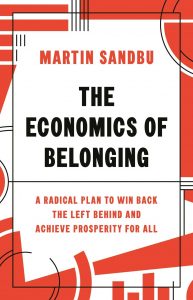By John Tomaney, University College London
In The Economics of Belonging: A Radical Plan to Win Back the Left Behind and Achieve Prosperity for All, Martin Sandbu seeks to address the extent to which many citizens of western democracies feel ‘left behind’ by recent economic changes, proposing a detailed plan for creating a just economy where everyone can belong. While finding this a highly readable and carefully argued book that offers a number of persuasive policy prescriptions, John Tomaney questions whether it provides a fully convincing programme for the left-behind.
Over recent years, readers of Martin Sandbu’s thoughtful Financial Times column, ‘Free Lunch’, have watched his attempts to wrestle with the backlash against globalisation that has swept across liberal democracies. His ideas have now been brought together in The Economics of Belonging: A Radical Plan to Win Back the Left Behind and Achieve Prosperity for All. In conceiving the political upheavals in the west in terms of ‘the end of belonging’ (8), Sandbu seeks to capture the way that many citizens of western democracies have been ‘left behind’ by recent economic changes, no longer feeling they have a place in the economy and consequently lending their support to a politics of ‘illiberalism’. Sandbu’s aim is to defend an open, liberal-democratic, market-based order against its detractors. While critical of recent policy directions, like John Maynard Keynes he comes not to bury capitalism, but to save it.
For Sandbu, the period after the Second World War in the west saw the extension of individual rights, the rule of law, free elections, the social market economy and political and economic ‘openness’, in ways that underpinned broadly rising living standards, declining inequality and assured security and social respect for the working class. Now we see rising inequality, declining incomes and slowing productivity growth. Within a generation, a radical redistribution of global income has occurred at the expense of western workers, providing the basis for a ‘populist’ politics of ‘usurpation’, which declaims that the right to earn a living has been stolen by ‘foreigners’. Sandbu’s purpose is to defend globalisation, claiming: ‘Economic openness is not just compatible with a domestic economics of belonging; with the right policies, more globalisation can make it stronger’ (208).

Economic changes, rather than shifts in cultural attitudes, explain the rise of populism in this account. Being economically left-behind creates psychological stress that erodes personal control, propelling voters into the arms of populist leaders, which helps to explain why electoral revolt is concentrated in places vulnerable to restructuring. It is not globalisation that has driven these processes, according to Sandbu, but structural change and (national) policy. The shift to a service economy and the decline of collective bargaining has undermined the post-war social settlement, while tax reforms favoured higher income groups and the owners of assets. Economic risk was transferred to the individual and created the conditions for the emergence of a precariat. The global financial crisis of 2008 – the consequence of a bloated and poorly regulated financial sector – precipitated a steep fall in living standards, exacerbated by austerity, leading to the unravelling of the economics of belonging.
But globalisation, in Sandbu’s telling, is the scapegoat for other causes of our present predicament. Skill-biased technological change and the shift to a knowledge economy are a bigger cause of manufacturing job loss than trade; immigration has little impact on jobs and living standards; and financialisation, while destructive, is not constitutive of globalisation.

Sandbu offers a paean to the Nordic model, where the survival of collective bargaining limits income inequality, wage compression is the motor of productivity growth and high quality training facilitates shifts between jobs as industries expand and contract. While replicating this model in detail is impossible, extending its principles is realistic, Sandbu argues, making a case for implementing high minimum wages, universal basic income, limiting monopoly power and strengthening workplace rights. He proposes reforms to the banking system to enable a shift from credit lending to equity financing to encourage more productive forms of investment. For Sandbu, policymakers overlook the costs of weak effective demand, especially on the left-behind, and he accuses central banks of ‘learned helplessness’ in macroeconomic management (165). In the realm of taxation, he advocates net wealth taxes, more effective corporation taxes and higher taxes on negative externalities (notably, carbon emissions), and he proposes a trade regime based on common labour and environmental standards to promote ‘economic togetherness’ (8).
Particular attention is paid to ‘left-behind’ places where the populist revolt is strongest, and Sandbu calls for compensation for places affected by economic restructuring, measures to connect them to successful agglomerations and physical and financial investments to maintain aggregate local demand. In particular, he calls for targeted business extension measures, customised job training, new roads, public transport and better broadband, improved ‘social infrastructure’, investments in cities to attract knowledge workers and efforts to ‘globalise’ lagging regions by nurturing their export potential. He acknowledges that not all places will benefit from this approach, which raises the question of what happens to those that are left even further behind. The reference to ‘social infrastructure’ is undeveloped, but it is suggestive of debates about the ‘foundational economy’.
The Economics of Belonging is an important contribution to the debate about the ‘left-behind’. Sandbu offers a highly readable and carefully argued narrative, which marshals evidence adroitly and proposes a range of policy prescriptions, many of which are persuasive and deserve serious attention. But does it amount to a convincing programme for the left-behind? Among the obvious gaps, Sandbu has little to say about the contemporary geopolitics that are reshaping patterns of international trade. China and Russia currently present themselves as ‘civilisational states’ with strategic interests that may limit the effects of his proposed policies. Crucially, Sandbu never really presents a clear definition of belonging: the term does not appear in the index. In practice, his analysis rests on a methodological individualism in which utility-maximising individuals respond to (social) market signals. He overlooks the affective and collective dimensions of belonging and the complex ways people form attachments to place and the uses they make of them.
Sandbu’s analysis also rests on assumptions about the essentially ‘illiberal’ culture of left-behind communities arising partly from an overdrawn distinction between the economic and cultural. In fact, we lack deep, qualitative understandings of the complex interplay of cultural and political change in such places. Left-behind places come in many shapes and sizes and this will likely confound well-meaning technocratic solutions. Bruno Latour has argued recently that belonging to a territory is the phenomenon most in need of rethinking. That rethinking must include listening to what the ‘left-behind’ actually want from the economy and polity.
John Tomaney is Professor of Urban and Regional Planning in the Bartlett School of Planning, University College London
Note: The views expressed in this article are the author’s, and not the position of Intellectual Dose, or iDose (its online publication). This article is republished from the LSE Review of Books under a Creative Commons license.



